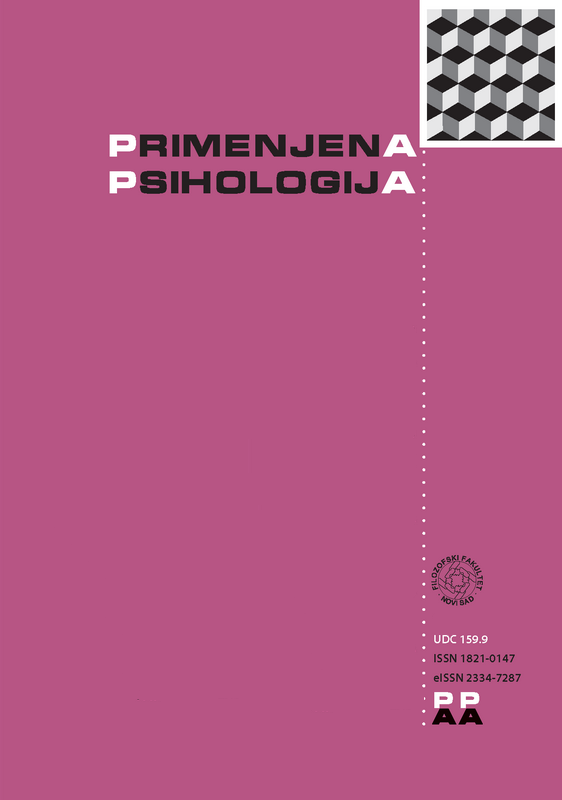DIFFERENCES IN SELF-PRESENTATION AND SELF-ESTEEM BETWEEN POSITIVE AND NEGATIVE PERFECTIONISTS
DOI:
https://doi.org/10.19090/pp.2017.2.281-290Keywords:
positive and negative perfectionism, perfectionistic self-presentation, explicit and implicit self-esteemAbstract
Research focusing on relationship between perfectionism and self-esteem is rather new and offers various and sometimes contradictory findings. Furthermore, a relationship between perfectionism and implicit self-esteem is still an under- investigated topic. The aim of this study was to explore differences in levels of implicit and explicit self-esteem and self-presentation between positive and negative perfectionists. One hundred and forty undergraduate psychology participants in two time points filled in the Self-Liking and Self- Competence Scale, the Perfectionistic Self-Presentation Scale, the Perfectionism Questionnaire, and the Implicit Associations Test. Results showed a significant difference in self-liking, nondisplay of imperfection, and nondisclosure of imperfection between positive and negative perfectionists. Positive perfectionists scored significantly higher on self-liking, and lower on nondisplay and nondisclosure of imperfection than negative perfectionists did. Positive perfectionists also had significantly higher levels of implicit self-esteem. There was no significant difference in self-competence and perfectionistic self-promotion between positive and negative perfectionists.References
Buhrmester, M. D., Blanton, H., & Swann, W. B. (2011). Implicit self-esteem: Nature, measurement and a new way forward. Journal of Personality and Social Psychology, 100(2), 365–385. doi:10.1037/a0021341
Crocker, J., & Wolfe, C. T. (2001). Contingencies of self-worth. Psychological Review, 108(3), 593–623. doi: 10.1037/0033-295x.108.3.593
Dunkley, D. M., Berg, J. L., & Zuroff, D. C. (2012). The role of perfectionism in daily self-esteem, attachment, and negative affect. Journal of Personality, 80(3), 633–663. doi:10.1111/j.1467-6494.2011.00741.x
Flett, G. L., & Hewitt, P. L. (2002). Perfectionism: Theory, research, and treatment. Washington, DC: APA.
Flett, G. L., Coulter, L. M., & Hewitt, P. L. (2012). The Perfectionistic Self-Presentation Scale–Junior Form: Psychometric properties and association with social anxiety in early adolescents. Canadian Journal of School Psychology, 27(2), 136–149. doi:10.1177/0829573511431406
Gotwals, J. K., Dunn, J. G., & Wayment, H. A. (2003). An examination of perfectionism and self-esteem in intercollegiate athletes. Journal of Sport Behavior, 26(1), 17–38.
Greblo, Z. (2012). Što se skriva iza pojma „perfekcionizam“? Povijest proučavanja i pregled različitih konceptualizacija perfekcionizma [What is hiding behind the term “perfectionism”? The history of investigating perfectionism and overview of different conceptualizations of perfectionism]. Psychological Topics, 21(1), 195–212.
Greenwald, A. G., McGhee, D. E., & Schwartz, J. L. K. (1998). Measuring individual differences in implicit cognition: The lmplicit Association Test. Journal of Personality and Social Psychology, 74(6), 1464–1480. doi:10.1037/0022-3514.74.6.1464
Greenwald, A. G., Nosek, B. A., & Banaji, M. R. (2003). Understanding and using the Implicit Association Test: I. An improved scoring algorithm. Journal of Personality and Social Psychology, 85(2), 197–216. doi:10.1037/0022-3514.85.2.197
Hewitt, P. L., Flett, H. L., Sherry, S. B., Habke, M., Parkin, M., Ediger, E., . . . Stein, M. B. (2003). The interpersonal expression of perfection: Perfectionistic self-presentation and psychological distress. Journal of Personality and Social Psychology, 84(6), 1303–1325. doi:10.1037/0022-3514.84.6.1303
Hill, A. P., Hall, H. K., & Appleton, P. R. (2011). The relationship between multidimensional perfectionism and contingencies of self-worth. Personality and Individual Differences, 50, 238–242. doi:10.1016/j.paid.2010.09.036
Jelic, M. (2008). Odnos samopoštovanja i motiva samopoimanja [The relationship between self-esteem and self-motives] (Unpublished doctoral dissertation). Department of Psychology at the Faculty of Humanities and Social Sciences, Zagreb.
Jelic, M. (2012). Nove spoznaje u istraživanjima samopoštovanja: Konstrukt sigurnosti samopoštovanja [New findings in self-esteem research: Self-esteem security]. Društvena istraživanja: Journal for General Social Issues, 21(2), 443–463. doi:10.5559/di.21.2.08
Jelic, M., & Tonkovic, M. (2009). Test implicitnih asocijacija u ispitivanjima samopoštovanja [Implicit Association Test in self-esteem research]. Psychological topics, 18(1), 183–201.
Koivula, N., Hassmen, P., & Fallby, J. (2002). Perfectionism and self-esteem in elite athletes: effects on competitive anxiety and self-confidence. Personality and Individual Differences, 32, 865–875. doi:10.1016/S0191-8869(01)00092-7
Lauri Korajlija, A. (2010). Perfekcionizam i anksiozna osjetljivost kao rizični faktori za pojavu anksioznih smetnji: Kvantitativna i kvalitativna studija [Perfectionism and anxiety sensitivity as a predictor of anxiety: Mixed method study] (Unpublished doctoral dissertation). Department of Psychology at the Faculty of Humanities and Social Sciences, Zagreb.
Leary, M. R., Tambor, E. S., Terdal, S. K., & Downs, D. L. (1995). Self-esteem as an interpersonal monitor: The sociometer hypothesis. Journal of Personality and Social Psychology, 68(3), 518–530. doi:10.1037//0022-3514.68.3.518
Mackinnon, S. P., & Sherry, S. B. (2012). Perfectionistic self-presentation mediates the relationship between perfectionistic concerns and subjective well-being: A three-wave longitudinal study. Personality and Individual Differencies, 53, 22–28. doi:10.1016/j.paid.2012.02.010
Rheaume, J., Freeston, M. H., & Ladouceur, R. (1995). Functional and dysfunctional perfectionism: Construct validity of a new instrument. Paper presented at the 15th Annual Convention of the WCBCT, Copenhagen, Denmark.
Stoeber, J., & Otto, K. (2006). Positive conceptions of perfectionism: Approaches, evidence, challenges. Personality and Social Psychology Review, 10, 295–319. doi:10.1207/s15327957pspr1004_2
Tafarodi, R. W., & Swann, W. B. (1995). Self-liking and self-competence as dimensions of global self-esteem: Initial validation of measure. Journal of Personality Assessment, 65(2), 322–342. doi:10.1207/s15327752jpa6502_8
Tafarodi, R. W., & Swann, W. B. (2001). Two-dimensional self-esteem: Theory and measurement. Personality and Individual Differences, 31, 653–673. doi:10.1016/S0191-8869(00)00169-0
Zeigler-Hill, V., & Terry, C. (2007). Perfectionism and explicit self-esteem: The moderating role of implicit self-esteem. Self and Identity, 6, 137–153. doi:10.1080/15298860601118850







